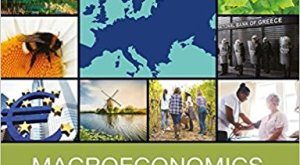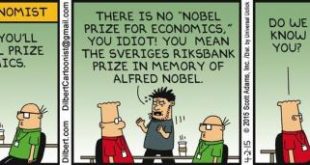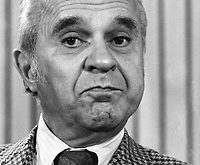At last — a real-world economics textbook In the real world, where issues of motivation, labor relations, and power are also important, the classical idea that [regulations, labor union activities, and public ‘safety net’ policies] cause substantial unemployment can be called into question … Alternative explanations of the working of labor markets suggest a different perspective … While some Keynesian theorists emphasize sticky wages, Keynes’s critique of...
Read More »Die Tagesschau — reine propaganda
Die Tagesschau — reine propaganda [embedded content] div{float:left;margin-right:10px;} div.wpmrec2x div.u > div:nth-child(3n){margin-right:0px;} ]]> Advertisements
Read More »Vem får Nobelpriset i ekonomi 2017?
Vem får Nobelpriset i ekonomi 2017? Traditionsenligt anordnas i dagarna en omröstning om vem Ekonomistas läsare tror kommer att få årets s. k. Nobelpris i ekonomi. Lika traditionsenligt finns det bara med en svensk på Ekonomistas lista. En person som inte alls hör hemma på en sådan lista. Sedan lång tid har vårt lilla land inte lyckats avla fram några riktigt framstående neoklassiska mainstream — andra kommer som vi alla vet ytterst sällan i fråga —...
Read More »On the importance of pluralism
On the importance of pluralism Theorien für die keine Alternativen in Betracht kommen scheinen, degenerieren allzuleicht zu dogmatisierten Systemen, die ihre Schwierigkeiten mit Hilfe von Alibi-Klauseln, ad-hoc-Annahmen und Abgrenzungspraktiken, kurz; durch Anwendung von Immunisieringsstrategien, zu bewältigen. Hans Albert Marktsoziologie und Entscheidungslogik The only economic analysis that mainstream economists accept is the one that takes place within...
Read More »Why MMT is so popular
Why MMT is so popular Now we can see why MMT is so popular … We are in an MMT world, where we should be using fiscal policy and not worrying about the deficit, but policymakers don’t understand that. I think most mainstream macroeconomists do understand this, but we are not often heard. The ground was therefore ripe for MMT. Policymakers following austerity when they clearly should not annoys me a great deal, and I am very happy to join common cause with...
Read More »Mainstream economics — like butter scraped over too much bread
Mainstream economics — like butter scraped over too much bread Much of current academic teaching and research has been criticized for its lack of relevance, that is, of immediate practical impact … I submit that the consistently indifferent performance in practical applications is in fact a symptom of a fundamental imbalance in the present state of our discipline. The weak and all too slowly growing empirical foundation clearly cannot support the...
Read More »Den akademiska byråkratiseringen
Statsvetaren Patrik Hall vid Malmö presenterade statistik på DN Debatt gällande antalet anställda inom vissa yrkeskategorier i offentlig sektor och deras utveckling under perioden 2001-2013 … Jag blev nyfiken på hur det ser ut inom den svenska universitets-världen när jag läste Halls artikel. Känslan är nämligen att även svenska universitet lider av en växande byråkratisering, med ökande krav från den ”centrala administrationen” och underskott i assistenter och sekreterare...
Read More »Jerusalem
[embedded content] div{float:left;margin-right:10px;} div.wpmrec2x div.u > div:nth-child(3n){margin-right:0px;} ]]> Advertisements
Read More »Die Antwort
Mein junger Sohn fragt mich: Soll ich Mathematik lernen? Wozu? möchte ich fragen. Daß zwei Stück Brot mehr ist als eines: Das wirst Du auch so merken! Mein junger Sohn fragt mich: Soll ich Englisch lernen? Wozu? möchte ich fragen. Dieses Reicht geht unter und reibe Du nur mit der flachen Hand den Bauch und stöhne und man wird Dich schon verstehen. Mein junger Sohn fragt mich: Soll ich Geschichte lernen? Wozu? möchte ich fragen. Lerne nur Deinen Kopf in die Erde zu stecken,...
Read More »Der Kapitalismus
[embedded content] div{float:left;margin-right:10px;} div.wpmrec2x div.u > div:nth-child(3n){margin-right:0px;} ]]> Advertisements
Read More » Lars P. Syll
Lars P. Syll






